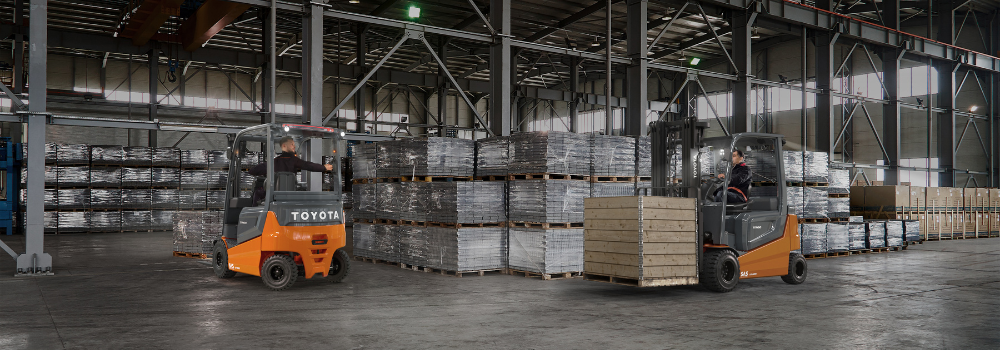When it comes to powering your operation, internal combustion engine (ICE) trucks remain a reliable and efficient choice, especially for demanding, outdoor applications. At Toyota, we offer a full range of diesel and LPG-powered counterbalance trucks that combine strength, compliance, and performance.
Advantages and disadvantages of diesel and LPG forklifts:
Whether you’re exploring your first ICE truck or comparing fuel types, this guide breaks down everything you need to know—including the benefits, trade-offs, and when diesel or LPG might be the right fit for your operation.
What is an internal combustion engine forklift?
Internal combustion forklifts are powered by diesel or LPG (liquefied petroleum gas) and are often favoured for heavy-duty outdoor tasks, there’s no charging downtime with quick refuelling and you're back to work.
Advantages of internal combustion engine forklifts:
- Low upfront cost
- Fast and easy refuelling
- High torque and lifting speeds
- Outstanding performance on gradients
- Ideal for outdoor and all-weather applications
- Long run time between refuels
When are engine trucks the best fit
Thanks to their power and endurance, diesel and LPG trucks are perfect for heavy-duty industries, such as:
- Construction sites
- Ports and harbours
- Lumber yards
- Waste disposal
- Outdoor operations on uneven ground
If your environment demands strength and stamina, internal combustion could be your most productive choice.
Understand stage V emission regulations
Toyota’s entire combustion engine range is fully compliant with Stage V—the latest European regulation for emissions from non-road mobile machinery (EU 2016/1628). Introduced in 2019, this standard limits emissions from both diesel and LPG engines, helping businesses reduce their environmental impact without compromising on performance.
So, what are the advantages and disadvantages of diesel and LPG forklifts and which is best for you?
Diesel forklifts advantages:
- Strong residual value at end of life
- High durability and longevity
- Lower purchase cost than electric trucks
- Best for outdoor, high-capacity work
Diesel forklifts disadvantages:
- Higher emissions than LPG or electric
- Noisier operation
- Rising fuel costs may affect long-term ROI
- Less suitable for indoor or small-space use
- Maintenance can be more costly, although less frequent
Diesel forklifts are the least environmentally friendly option, so may not align with long-term sustainability goals. However, for tough environments and outdoor lifting, they’re hard to beat on performance and endurance.
LPG forklifts advantages:
- Lower emissions than diesel
- Lower purchase cost than electric and diesel
- Efficient fuel usage and long run times
- Can be used both indoors and outdoors with adequate ventilation
LPG forklifts disadvantages:
- Lower residual value at end of life
- Higher maintenance costs over time
- Less suited to tight warehouse navigation
- Not as sustainable as electric options
LPG trucks offer more versatility than diesel, with the ability to operate in both open and covered environments. While not emission-free, they strike a balance between cost, flexibility, and performance.
| Feature | Diesel | LPG |
| Emissions | Higher | Lower |
| Indoor use | Not suitable | Possible with ventilation |
| Outdoor use | Excellent | Excellent |
| Refuelling | Quick | Quick |
| Noise | High | Lower |
| Initial cost | Low | Low |
| Residual value | High | Low |
| Maintenance | Less frequent, but higher cost | More frequent, higher cost |
| Sustainability | Lowest | Moderate |
Finding the right energy solution for you
Whether you’re choosing diesel, LPG, or exploring other energy options, at Toyota we’re here to help you find the right solution for your business. We work with you as your trusted energy advisor to assess your current setup, goals, and challenges to find the right the fit for you.
